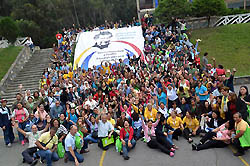

| Ecuador – Congress on Salesian Education |
| Venezuela – Celebration of 45 years of the Association of the “Damas Salesianas” |
(ANS – Los Teques) – In response to the Rector Major’s invitation, the Salesian Family in Venezuela held its fourth Congress on Salesian Pedagogy from 24 to 26 April at the Liceo San José. It aimed at a deeper study and renewal of the Preventive System in the Salesian works. More than 600 educators and pastoral workers took part. They are all people who share in Don Bosco’s charism – the educative charity of the Good Shepherd, as the Rector Major defined it in his letter to the participants.
The theme of the Congress was “The Preventive System and the family, educating for a culture of peace”. This theme had already been studied in seven regional gatherings. Concern for a peaceful united Venezuela ran through the thoughts and the talks of the invited experts.
The Congress was organized by the Network of the Salesian Family in Venezuela (REFSVEN), made up of: two Salesians, Frs Francisco Méndez and Alfredo Oliveros; Doctor Aldo Dell’Uomini; Sister Maigualida Rizzo, FMA, of the Daughters of Mary Help of Christians; Doctor Scampola Aponte and Sister Sandra Garcia of the Daughters of the Divine Saviour (HDS); Sister Hidalgo Yolimar of the Daughters of the Sacred Hearts of Jesus and Mary (HHSSCC); a Salesian Cooperator, Thais Candia; and Karely Guerra and Estela Roa, representatives of the Association of Salesian Women (ADS).
This Fourth Congress on Salesian Pedagogy saw the participation of experts in Education, Salesian studies and Peace Processes. “Pastoral Work and Education” was the topic dealt with by Fr Miguel Ángel García from the Department of Youth Ministry. His presentation began with questions: “How can the school be a place of evangelization? Can all aspects of this mission be met? How can we and should we try to form Christians through our work in schools?” In his talk he developed the principal points for an understanding of the Salesian school as an effective platform for evangelization. Among these he stressed the following: education as a place and means of evangelization; the vocation to the service of education; professional training; the training of lay people and the strategy of co-responsibility.
The Salesian School in America (ESA) and its proposal for a renewed understanding of the Preventive System were the central themes of the talk by Sister Ana Julia Suriel, Delegate for Youth Ministry of the FMA in the Antilles. She had taken part in the work of the ESA from Cumbayá I (1994) to Panama (2013). In her conclusion she said: “The great challenge of the school is to educate for life … This is precisely what we are trying to get going through our “process of redefining” which started in 1994 … This attempt to re-read and study more deeply the Preventive System involves all the members of the Salesian Family in which, today more than ever, we recognize and value the involvement of lay people.”
In his contribution on “The Preventive System and the Family in Venezuela,” Fr Alejandro Moreno pointed out the peculiarities of the ordinary Venezuelan family, similar to the family in other Latin American countries. He showed how the Preventive System is well suited to the situation and can become an important element in facilitating the education of children and young people from an ordinary background.
Doctor Antonio Pérez Esclarín’s topic was “Education to citizenship and the culture of peace”. He spoke of the vocation of the educator, called to a mission to transform.
“This is not the time for educators fixed in their ways, who are submissive and fearful, inclined to pull back when faced with the immense challenges that we have to meet,” he said. “These are times when we need courageous educators who are creative and capable of overcoming difficulties. The people are the most important richness and beauty of Venezuela. The educators’ task is to cultivate and nourish this richness. In the ultimate analysis, educating means making people better in order to have a better country. “
The final speaker was Doctor Fernando Pereira, from the Venezuelan Organization for the Defence of Human Rights “CECODAP”. He asked the question, “How committed are we to the culture of peace in our educational institutes?” He focused his talk on violence in schools and offered four helps to face the situation: formation, participation, internal and external coordination, and continuity.
This fourth congress also included reports on some successful experiences in the pastoral work and formation of each group of the Salesian Family. The FMA reported on four such experiences; one for teachers on “Training in the Preventive System”; one for young people on “Student leadership and volunteering”; one for families, “Family in Action”, and finally one for schools “Curriculum planning from the point of view of capabilities”.
The Salesians described different experiences: “Systematic Training in educational works”, “Missionary Experiences”, “Negotiating conflict” and “Young people in work training”.
The Daughters of the Sacred Hearts of Jesus and Mary described their experience in “Community Evangelization”. The Daughters of the Divine Saviour spoke on “Evangelization in the school” while the Association of Salesian Women also spoke on “Formation for work”.
Published 10/05/2013
